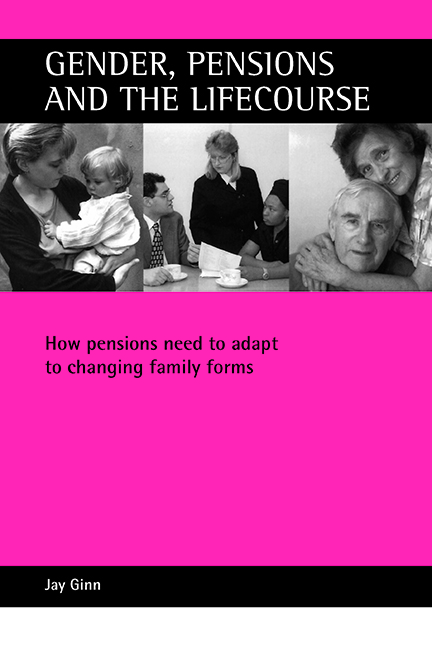Book contents
- Frontmatter
- Contents
- List of tables and figures
- Acknowledgements
- one Trends in gender relations, employment and pensions
- two Choice and risk in pensions: gender and class inequalities
- three Pension prospects for minority ethnic groups
- four Changing patterns of partnership: divorce and pensions
- five Impact of motherhood on pension acquisition: differentiation according to education
- six Gender and pensions in the European Union: towards an independence model?
- seven British pension policy: a gender perspective on alternative rescue plans
- References
- Appendix Statistical tables
- Index
three - Pension prospects for minority ethnic groups
Published online by Cambridge University Press: 20 January 2022
- Frontmatter
- Contents
- List of tables and figures
- Acknowledgements
- one Trends in gender relations, employment and pensions
- two Choice and risk in pensions: gender and class inequalities
- three Pension prospects for minority ethnic groups
- four Changing patterns of partnership: divorce and pensions
- five Impact of motherhood on pension acquisition: differentiation according to education
- six Gender and pensions in the European Union: towards an independence model?
- seven British pension policy: a gender perspective on alternative rescue plans
- References
- Appendix Statistical tables
- Index
Summary
This chapter examines the pension arrangements made by British men and women of working age from five minority ethnic groups – Indian, black, Chinese/other, Pakistani and Bangladeshi, compared with white. Key questions are the extent to which private pension coverage is lower for men and women from each ethnic minority, compared with white people; whether ethnic differences in coverage relate mainly to variation in employment participation; whether gender inequality in pension coverage is similar across all ethnic groups; and whether the influence of motherhood on employment and pension scheme membership applies equally to women from each ethnic group. The chapter is based on research using three years of the British Family Resources Survey combined, 1994/95, 1995/96 and 1996/97 (Ginn and Arber, 2000b, 2001). First, the income and receipt of private pensions by older men and women from minority ethnic groups are compared with that of white people.
Incomes of older men and women from minority ethnic groups
Incomes of older British individuals from minority ethnic groups are on average lower than those of white people and reliance on means-tested income support is greater (Berthoud, 1998), with particularly high rates of poverty among minority ethnic women who are not married. In each ethnic group older women’s personal income is lower than men’s (Ginn and Arber, 2000b). In terms of other measures of wealth – car ownership and housing tenure – older people from minority ethnic groups tend to be disadvantaged, although certain ethnic groups such as Indians and Chinese have rates of home ownership comparable with that of white people.
White men aged over 60 had a median personal income of £141 per week in the mid-1990s, compared with only £120 for black people, Indian and Chinese/other men (see Table 3.1, first two columns). Although the Pakistani/Bangladeshi group of men had a higher income, this must be set against the very low income of women in this group. The gender gap in income was least among black people (Table 3.1, third column). Thus among those aged over 60, white women’s median income was 62% of men’s but black women’s was 80% of black men’s. The gender gap in income was wider for older Indians than for white people and wider still for older Pakistanis/Bangladeshis.
- Type
- Chapter
- Information
- Gender, Pensions and the LifecourseHow Pensions Need to Adapt to Changing Family Forms, pp. 37 - 50Publisher: Bristol University PressPrint publication year: 2003



